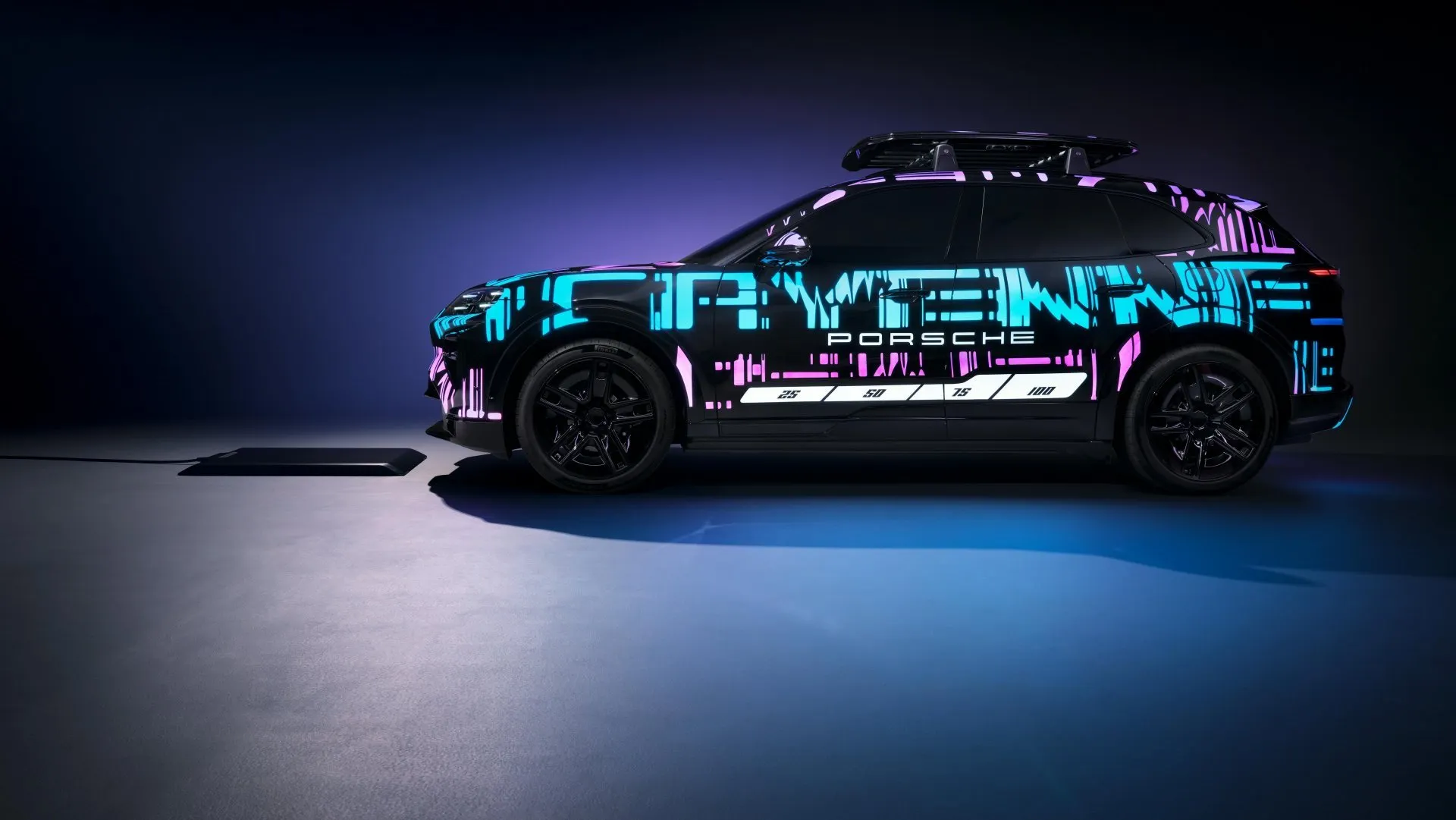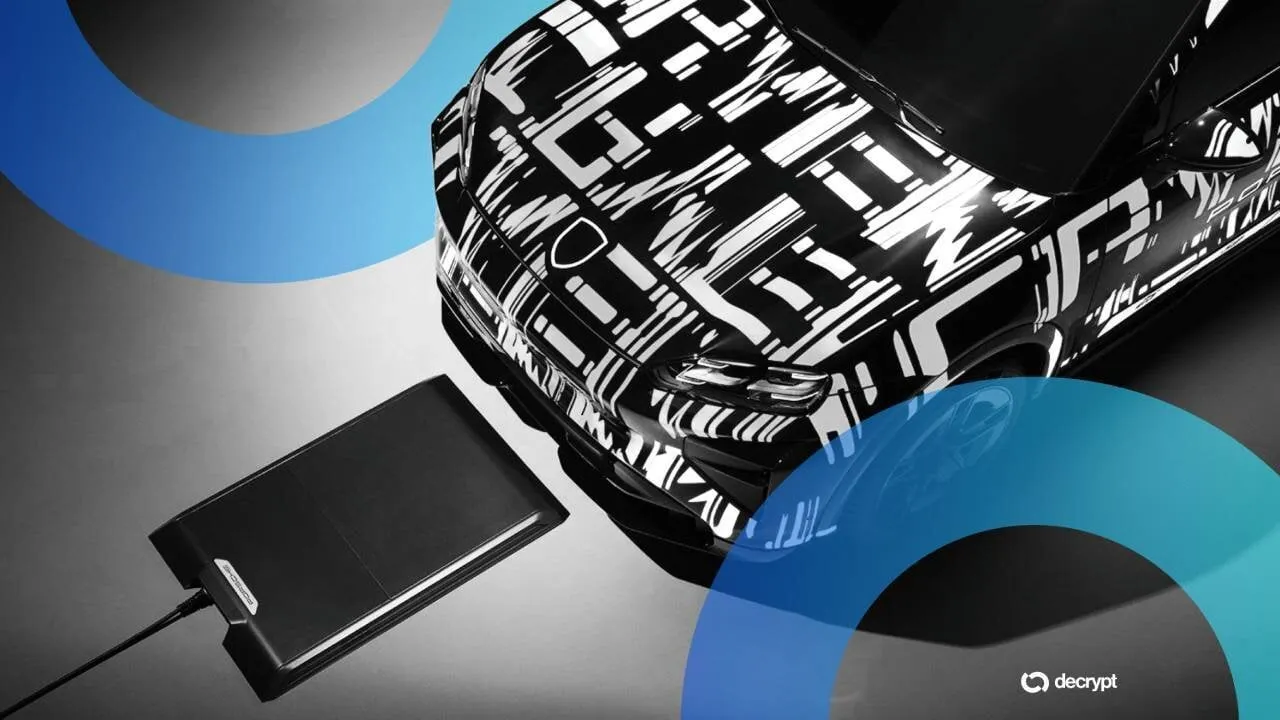In brief
- Porsche will unveil its 11 kW wireless charging system in Munich next week, the automaker said Thursday.
- Wireless charging will be offered in Europe from 2026, with global markets to follow.
- A floor pad transfers power to a receiver under the SUV; efficiency is ~90%, comparable to plug-in charging.
Porsche will unveil its long-anticipated 11 kW wireless charging system for its 2026 Cayenne Electric at the IAA motor show in Munich next week, the company said Thursday.
The wireless charging system was first announced in the spring. Technically, Porsche isn’t the first to go cable-free—it’s the latest to join a growing list of automakers experimenting with inductive charging. BMW briefly offered a wireless option on its 530e plug-in hybrid back in 2018, and Genesis has tested similar systems.
But Porsche is the first automaker planning to bring inductive charging to a fully electric SUV at scale, making it more than just a pilot or niche accessory. Volkswagen, Stellantis, Hyundai, Volvo, and even Tesla have signaled interest through R&D, pilots, or acquisitions, but Porsche’s rollout is the first with firm timing and safety certifications behind it.
Porsche’s move matters because it brings the tech to a mass-market luxury SUV, with the brand emphasizing efficiency and user experience rather than just novelty.
What makes Porsche’s system different
The Cayenne Electric will come with a receiver plate tucked into its underbody. Park over a flat floor pad, and the system uses ultra-wideband tech to line things up automatically. The car then lowers itself within a few inches of the pad, charging begins, and Porsche says it delivers 90% efficiency—on par with plug-in charging.
Safety was a big focus: motion sensors and foreign-object detection cut power if anything slips between pad and car, and the pad itself is weatherproof and TÜV, CE, and UL certified. Drivers can manage sessions through the My Porsche app, and the Surround View parking system offers alignment visuals. It’s designed to feel like magic—park, stop, walk away, and the car charges.

The system is reportedly safe for cats, who have been known to favor sleeping under cars in garages. The system can detect when something is on it and shut off until your pet has moved on; it'll even send a notification to your phone, letting you know that recharging has been temporarily suspended.
Market timing and costs
This won’t hit your local showroom this year. Porsche plans to launch in Europe in 2026, then expand globally. The Cayenne Electric itself will debut by the end of 2025, with the wireless tech as an optional extra.
Convenience will be priced accordingly. Early estimates put the receiver hardware at about €2,000 ($2,330) and the pad near €5,000 ($5,825), plus installation—squarely a luxury option for those already buying a Cayenne. While pricing hasn't been set for the EV the 2026 base model is expected to launch at around $100,000.
The U.S. picture: Pilots, pads, and roads
In the United States, wireless charging hasn’t gone mainstream but is steadily moving from concept to pilot:
-
Plugless Power has been selling aftermarket pads for models like the Nissan Leaf since 2014, though at lower wattages.
-
WiTricity, based in Massachusetts, has launched an 11 kW Halo system and recently piloted wireless charging for Ford E-Transit vans at the Port of Long Beach.
-
Detroit’s Corktown district has a quarter-mile wireless road built with Electreon, soon to extend to a full mile.
-
Purdue University and the Indiana DOT plan to test highway-speed charging on a U.S. route segment.
-
Los Angeles is installing inductive coils under a campus road at UCLA ahead of the 2028 Olympics.
These projects show the U.S. is treating wireless charging as both a fleet solution and an infrastructure experiment—though no domestic automaker has yet committed to factory-built consumer models.
Why it matters
With the SAE J2954 international wireless standard finalized in 2024, Porsche’s decision gives the technology a legitimacy boost. If luxury buyers embrace the potentially $8,000+ convenience of skipping cables, other automakers may follow with mass-market options.
For now, Porsche’s Cayenne Electric rollout highlights the gap between what’s technically possible and what most EV drivers can actually afford—making wireless charging both a headline and a harbinger. Best of all, it won't fry your cat.

